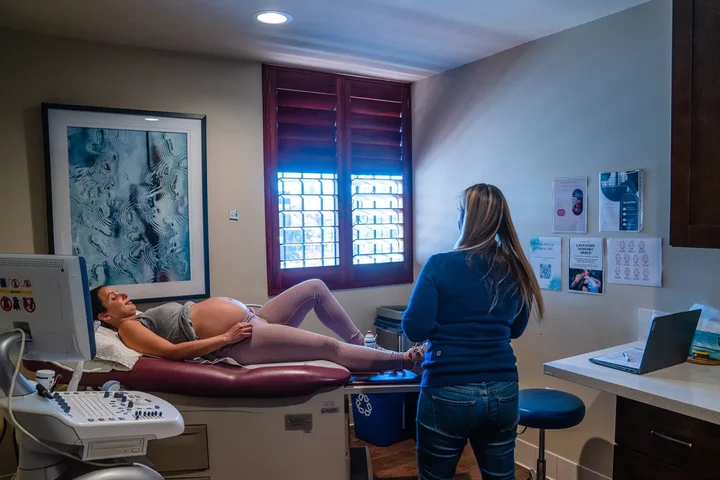Sally K., left, thirty-eight weeks pregnant, talks to midwife Andrea Bergleen, right, during a check-up at the Best Start Birthing Center in San Diego on March 20, 2024. Photo by Ariana Drehsler for CalMatters
###
This story was originally published by CalMatters. Sign up for their newsletters.
###
Women in California today have fewer places to give birth than they did a decade ago. Legislation signed this week by Gov. Gavin Newsom aims to create more options for them by making it easier for birth centers to operate outside of hospitals.
The “Freedom to Birth Act” by Assemblymember Mia Bonta, a Democrat from Oakland, streamlines burdensome licensure requirements that have prevented birth centers from receiving state approval. Without licensure, birth centers frequently can’t contract with health insurers or Medi-Cal. That leaves patients who can’t pay cash unable to use midwives or birth centers.
The legislation was introduced and signed following reporting by Cal Matters over the past two years revealing that vast areas of California have no hospitals or birth centers following dozens of closures. In some areas, pregnant people may have to drive two hours to give birth at a hospital.
“The fact that (CalMatters is) quoted in every letter of support that was sent to the Legislature and to the governor’s office asking for his signature says a lot,” said Sandra Poole, a lobbyist with the Western Center on Law and Poverty, which co-sponsored the legislation. “The information you provided was foundational in the work that we did in this area.”
Birth centers, which are most commonly owned and operated by midwives, specialize in low-risk, out-of-hospital births. Research shows that midwife-led deliveries at birth centers are safe and lead to fewer interventions like cesarean sections.
Over the past three years, at least 20 birth centers have closed in California, according to CalMatters reporting and the California chapter of the American Association of Birth Centers. Of the roughly 30 facilities left, only four are licensed by the state public health department.
The birth center closures come at the same time that hospitals have closed dozens of labor and delivery wards. Nearly 60 maternity wards have closed since 2012, according to a CalMatters database.
The new law removes a mandate that birth centers operate within 30-minutes of a hospital with labor and delivery services and removes duplicative Medi-Cal requirements. The measure passed unanimously in the Assembly and the Senate.
“Red tape should never stand in the way of proven solutions to deliver affordable and accessible healthcare for Californians. By signing (the law), our state has taken a much-needed step to address the maternal health crisis,” Bonta said in a statement.
Survey: More than half of women consider midwives for birth
The new law is a crucial step toward making birth centers and out-of-hospital births more accessible, advocates say.
“When we first started looking at this issue there were 10 licensed birth centers on the state website. Then you start calling folks and it became six, and now we’re down to four,” Poole said. “It’s going in the wrong direction for sure.”
Poole said she’s hopeful the relaxed regulations will encourage more birth centers to open and allow those that have given up on licensure to try again. Doing so would also make the services more accessible for low-income families. Medi-Cal, the state insurance program for people with disabilities and low-income people, pays for half of all births in the state.
Most births happen in hospitals, but midwives deliver a growing number of babies in the state. Planned out-of-hospital births increased by 30% over the past decade even as birth rates overall declined, according to data from the Medical Board of California.
A 2018 survey by the California Health Care Foundation found that more than one-third of pregnant patients would be interested in having a midwife for a future birth. That interest was highest among Black women. More than 50% of women who wanted a midwife at birth said they didn’t use one because insurance wouldn’t pay for it.
Cindy Haag, a licensed midwife, has operated Pacifica Family Maternity Center in Berkeley for 13 years. In the beginning she tried to get licensed thinking it would be easy. Instead, Haag said the process was onerous and confusing. The health department didn’t even know what a birth center license was when she applied, Haag said, a story that multiple midwives who have attempted licensure have told CalMatters. The application was denied.
Without licensure she couldn’t take Medi-Cal patients.
“It’s really sad because it changes the diversity and the accessibility,” Haag said.
In recent years, Haag has come to an agreement with a local Medi-Cal plan to take some of their patients who want to give birth with a midwife outside of the hospital. Still, without full licensure, the birth center is limited on how much it gets reimbursed for Medi-Cal patients.
“We are doing the right thing because we care about accessibility, but it’s not for our financial gain,” Haag said.
###
Supported by the California Health Care Foundation (CHCF), which works to ensure that people have access to the care they need, when they need it, at a price they can afford. Visit www.chcf.org to learn more.

CLICK TO MANAGE